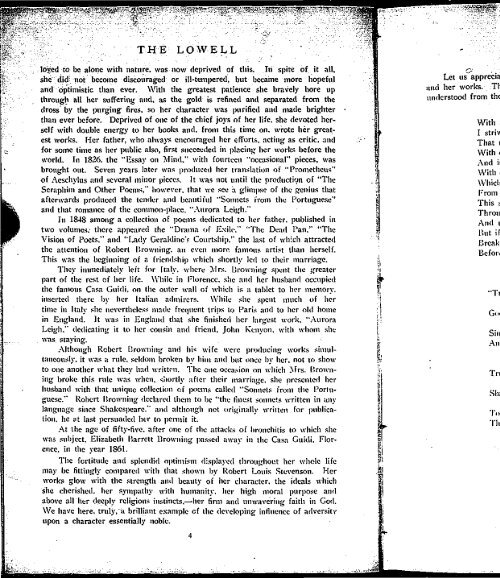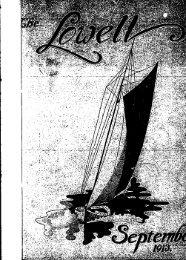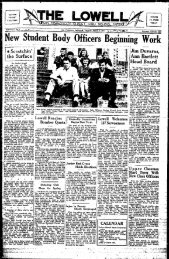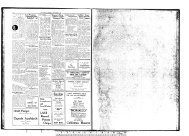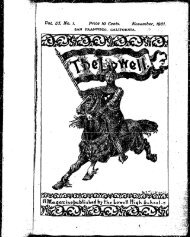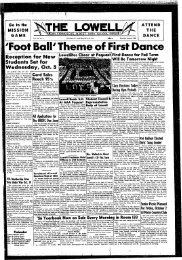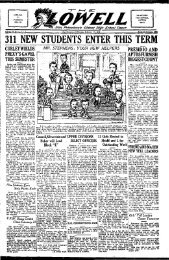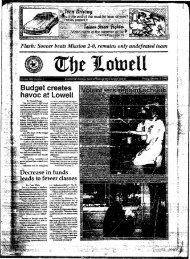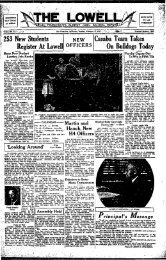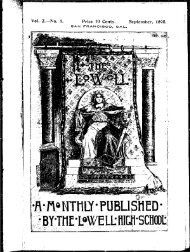- Page 2 and 3:
teForm! an impprtant;part in every
- Page 4 and 5:
S&Vv THE LOWELL YOUNG MEN who reali
- Page 6 and 7:
_ i,' THE LOWELL r'rrrwaa Lee smile
- Page 8 and 9:
THE LOWELL her. From where she stoo
- Page 10 and 11:
THE LOWELL The Aviation Meet A. J.
- Page 12 and 13:
lie;:- 7 ^^gfsm^^f^sn^ss^^wm^^sBm T
- Page 14 and 15:
••:••-: • -:'-:M, :-•<
- Page 16 and 17:
v ; THE LOWELL The Spanish Play The
- Page 18 and 19:
THE LOWELL Crossing the Snow—A Tr
- Page 20 and 21:
A Monthly, Published By the Student
- Page 22 and 23:
RAMON POHLI, '09; U. C, '14. Lowell
- Page 24 and 25:
^ ^ Fuicn KANT. We arc very sorry t
- Page 26 and 27:
Jfeum THE PERMANENT SCHOOL PIN." CH
- Page 28 and 29:
THE LOWELL A new term has begun, al
- Page 30 and 31: 3 3 ~fer;r ^yppi BASKETBALL. Now th
- Page 32 and 33: JAMMS RANSAIIOI'T, Dec. '11. Mr. Wi
- Page 34 and 35: STAMP COLLECTORS Call and see my Se
- Page 36 and 37: 'V^ > #.;#tf *.; y •••••
- Page 38 and 39: ft Pterre Smith 1117 GEARY STREET K
- Page 40 and 41: THE LOWELL "The Hastings" Tuxedo Su
- Page 42 and 43: •t,^ y»^i^ : ^p^!?^i^^^ifSs^i
- Page 44 and 45: ^ 1 V : ..:.; - , ;; THE LOWELL "I
- Page 46 and 47: +iWj^ • ;•- : THE LOWELL A Coll
- Page 48 and 49: THE LOWELL " Lowell and Democracy I
- Page 50 and 51: THE LOWELL what the judges could ha
- Page 52 and 53: THE LOWELL rcndin"" it into shreds
- Page 54 and 55: THE LOWELL "Yes win by eliciting,"
- Page 56 and 57: THE LOWELL The Wreath San Sebastian
- Page 58 and 59: THE LOWELL J.—Aha; who's the lady
- Page 60 and 61: THE LOWEI.I. for January. 1911, is
- Page 62 and 63: A Monthly, Published By the Student
- Page 64 and 65: I 7 KKI> KANT. Throughout the month
- Page 66 and 67: January lias brought to us an excel
- Page 68 and 69: DEBATE. lumwKi) [-1. PARSONS. June
- Page 70 and 71: THE LOWELL "La Fuente de la Juventu
- Page 72 and 73: v:« This sport r lias ( just been
- Page 74 and 75: Preeman Coaching School Special Coa
- Page 76: f »#irs Some Timely Suggestions I
- Page 82 and 83: ••..:, . - . T H:E : :LdpLL V r
- Page 84 and 85: THE LOWELL things turn out as they
- Page 86 and 87: jiist ntle^;. been rasp ;ikecl ping
- Page 88 and 89: *i *!^r3j .X;-: r '-.•''..' ' i -
- Page 90 and 91: ••••
- Page 92 and 93: IlliPSSflff ftj®b^ " " '^ respecti
- Page 94 and 95: 1 !j THE LOWELL An Incident of Anci
- Page 96 and 97: H •fi i ' • • • " • " "
- Page 98 and 99: J. Vfe Jllffl I '&sJ&$%$%* i $!& :H
- Page 100 and 101: m Girls! Let me ask you one questio
- Page 102 and 103: ...... ; ^-©l i ' ' ' ••-•'
- Page 104 and 105: Nil HiPM nil • .;•••*?» ^
- Page 106 and 107: h TH.E LOWELL Mrs. Dcanc. who does
- Page 108 and 109: THE LOWELL ,> Boys' Athletics GEXEV
- Page 110 and 111: THE LOWELL The Uncle Kind. c Small
- Page 112 and 113: linner. finishhave here lor nox hop
- Page 114 and 115: THE LOWELL Puckett's Selecf. Academ
- Page 116 and 117: mmm iry of to pnge" Lstcni Ished P.
- Page 118 and 119: HIGH SCHOOL MEMORY BOOKS A Record o
- Page 120 and 121: If fact. 'THE LOWELL " ; GOING CAMP
- Page 122 and 123: SET hy bugh i ; ! ' • ' . v V .
- Page 124 and 125: »tHihg"ana v . / / • ; - • - :
- Page 126 and 127: isers Mi IllilllS m i mWi STREET i
- Page 128 and 129: *•-,• THE LOWELL 770 market Str
- Page 130 and 131:
Vol.. XVII. SAX FRAXCISCO. APRIL. l
- Page 132 and 133:
: T H E L O W E L L "Lovelorn." she
- Page 134 and 135:
THE LOWELL . and offered him a life
- Page 136 and 137:
THE LOWELL The Sheriff's Resignatio
- Page 138 and 139:
. THE LOWELL" r o " \nother man too
- Page 140 and 141:
a halter in his hand carefully look
- Page 142 and 143:
A Monthly, Published By the Student
- Page 144 and 145:
THE LOWELL Nc.\t en the calendar is
- Page 146 and 147:
RAMON POMI.I. W: U. C "14. Lowell h
- Page 148 and 149:
^ THE LOWELL The Executive Committe
- Page 150 and 151:
THE LOWELL Lowellitcs. the school t
- Page 152 and 153:
TENNIS. There is not much to say co
- Page 154 and 155:
place in the _,.._._ ^ pound class,
- Page 156 and 157:
^ ^f| '": '- '•' f ? '•- : 'f t
- Page 158 and 159:
THE LOWELL The Raymond Coaching Sch
- Page 161 and 162:
fife! :-.--.-.--';.: •-^•^'^r^;
- Page 163 and 164:
MR. FRANK MR. F. II. CI. 1 MR. FRAN
- Page 165 and 166:
§i One day in August, 1907. offici
- Page 167 and 168:
THE LOWELL wrote for THE LOWELL, or
- Page 169 and 170:
Great Rush to the Old Country. Lucr
- Page 171 and 172:
!i I -I in I1 \ GRAND WATER CARNIVA
- Page 173 and 174:
I A DAY IN THE JUNGLES. Yah! ha! ya
- Page 175 and 176:
\€ HOTEIz-IvSWS. "Pay-as-you-ente
- Page 177 and 178:
THE POET'S ROLL. Ed. Parsons—"He
- Page 179:
. / ; • nf Jutt^ 1311 ; "i;
- Page 183 and 184:
: - . / • - '
- Page 185 and 186:
\ -' !:••••. '•!.:ITI---
- Page 187 and 188:
I * ?*Tjg;w:* p -->*- r/in—* '•
- Page 189 and 190:
— >, .a J3O X >, Z "5 Bell •D C
- Page 191 and 192:
:,v.7-'?i'/*"V*v; — o I 2 ehol m
- Page 193:
il : ' : THE CLARION / CLARION'S BA
- Page 196 and 197:
'•-"myrn V. Right on we pushed th
- Page 198 and 199:
sm i ^Si-yn^- iC •:.''• •; %
- Page 200 and 201:
usIif I H SB 1gate tt 3£U ! iraaE/
- Page 202:
t ;••:••
- Page 206 and 207:
: - r '•' • < i •'; THE LOWEL
- Page 208 and 209:
THE LOWELL A Slip in Time and A Dip
- Page 210 and 211:
THE LOWELL swing toward him. To do
- Page 212 and 213:
THE LOWELL through whose doors thos
- Page 214 and 215:
--: ;S V-f:^:v;'"''^ • .'J-'V " ;
- Page 216 and 217:
Hi- THE LOWELL companion, "Then it'
- Page 218 and 219:
n THE LOWELL from the .safety which
- Page 220 and 221:
ii f-i I w THE LOWELL Gorilla Pete
- Page 222 and 223:
fell THE LOWELL The History of the
- Page 224 and 225:
II .f: THE LOWELL was first constru
- Page 226 and 227:
• ,' l i! .'! THE LOWELL My Grand
- Page 228 and 229:
I? w • 1 i THE LOWELL fury of com
- Page 230 and 231:
4; THE LOWELL At Twelve o'CIocK SYL
- Page 232:
I THE LOWELL "Oh. ho. so that's wha
- Page 235 and 236:
EDITORIAL STAFF
- Page 237 and 238:
THE.LOWELL "What now is bud will so
- Page 239 and 240:
w = J THE LOWELL Alfred Myer. Bert
- Page 241 and 242:
THE LOWELL climax. "A Merry Xmas" i
- Page 243 and 244:
nation cndcii rdonul ave a mting 11
- Page 245 and 246:
Oil.I I.
- Page 247 and 248:
« THE LOWELL m mmm\ -si The the en
- Page 249 and 250:
vie jer M.MSTIX UOSK.VI1I.ATT MKVK
- Page 251 and 252:
HARRIET ISRADFOKD, June 1911. The F
- Page 253 and 254:
t :
- Page 255 and 256:
5 '.r: II:" f i ! ; . SPANISH CLUB
- Page 257 and 258:
The dosing of this term marks the s
- Page 259 and 260:
GIRLS' GLEE CLUB
- Page 261 and 262:
N F 3 £..' 1 J
- Page 263 and 264:
I: *•;; m It m THE LOWELL The tea
- Page 265 and 266:
.i 4 1 5 6 .5 5 4 0 .5 1 5 1 5 14 .
- Page 267 and 268:
• • ' • ( . , } • 14 « •
- Page 269 and 270:
ind ne, he tie" rill a THE LOWELL T
- Page 271 and 272:
•I in ilie !'•> make been more
- Page 273 and 274:
BOYS TENNIS TEAM
- Page 276 and 277:
inn II ; MI GIRLS' TENNIS TEAM —
- Page 278 and 279:
THE LOWELL .-• r-ry;,iy-...^,yfi:
- Page 280 and 281:
THE LOWELL I-Ierc lies the body of
- Page 282 and 283:
1. 2. 3. 4. 5. o. Mever. THE LOWELL
- Page 284 and 285:
••.;•• •••;>^v •;;"
- Page 286 and 287:
it U 1! THE LOWELL The "rising youn
- Page 288 and 289:
m i• !i: V rhoncs: West 2026 Home
- Page 290 and 291:
1 ! If i j /^ TH (§1*0*•* Stamp
- Page 292 and 293:
[I 'i; (¥ ! !l I.-; r THE LOWELL W
- Page 294 and 295:
f I! i WieniawsKi's Gymnasium and O
- Page 296 and 297:
THE LOWELL The Raymond Coaching Sch
- Page 298 and 299:
•.•if-: •.- •• • o \ i
- Page 300 and 301:
•• ! WHY THE JUVENILE! BECAUSE
- Page 302 and 303:
II >'ll -i T'ji I THE NEWEST LOWELL
- Page 304 and 305:
* • ! SCHOOL DIRECTORY. Freshmen
- Page 306 and 307:
i Jim Ransohoff, '11, and Red Van V
- Page 308 and 309:
8 THE LOWELL ORGANIZATIONS. 'flic D
- Page 310 and 311:
I Mi —•MM AROUND SCHOOL;^ ' Tho
- Page 312 and 313:
— x ^" £ w .' . .. _ • ^> " '_
- Page 314 and 315:
wmmm !THE LOWELL YOUNG MEN OF THE D
- Page 316 and 317:
i6 THE LOWELL The Juvenile wishes t
- Page 318 and 319:
II. s ..V- "Well," she began, "my.
- Page 320 and 321:
CRITICISM. The "Newest Lowell" cert
- Page 322 and 323:
£M&W&E£}$ The Lowell; Orchestraha
- Page 324 and 325:
THE LOWELL Jinny CAtfSo^oFF cepr M'
- Page 326 and 327:
WONDER. After pursuing his studies
- Page 328 and 329:
! THE L0 WE L L Frozen Dam ties We
- Page 330 and 331:
stlv .• ' u . •: . YOUNGMER OF
- Page 332 and 333:
16 THE LOWELL The Juvenile wishes t
- Page 334 and 335:
iii *.BrSve'ly he.rushed,to : there
- Page 336 and 337:
A representative"'of THE- EOWEIX vi
- Page 338 and 339:
S! w . t>e j 6r ,«^THE LOWELL The
- Page 340 and 341:
you appear to, if you had racher go
- Page 342 and 343:
iJOKS ; The cast of "The Melting Po
- Page 344 and 345:
I: . f J. , I; ill Frbzen Dain ties
- Page 346 and 347:
|J is* Si :r • I "iff" -'IS :^S
- Page 348 and 349:
T HE LOWELL BOX-BACKS CKS YYou can
- Page 350 and 351:
p 1 f. '5 i THE LOWELL been crectdl
- Page 352 and 353:
!S 1 li 6. THE LOWELL A rally was h
- Page 354 and 355:
4 I 1 M • | 8 THE LOWELL The seco
- Page 356 and 357:
The stin shone brightly and temptin
- Page 358 and 359:
Frozen We are prepared to furnish F
- Page 360 and 361:
^ ^ ^ ^ ^ ^ We're "trotting out" so
- Page 362 and 363:
BOX-BACKS You can not but admire th
- Page 364 and 365:
lovely maiden, for 1 am Wohave, the
- Page 366 and 367:
FROM THE FACULTY. >iV.-!.---,--,-rV
- Page 368 and 369:
W The June '12 boat ride was a mark
- Page 370 and 371:
FOOTBALL. AtH The first league game
- Page 372 and 373:
IO THE- LOWELL •\ndromache says:
- Page 374 and 375:
12 THE LOWELL Phones: West 8335 S20
- Page 376 and 377:
?W^0^f^S^: "Heart Breakers" Yes. Ou
- Page 378 and 379:
..t*gi'iif j>;'.T-'r"-'••".'r:i
- Page 380 and 381:
•,"V , A ABOUT ^THE I^LO WELL SCH
- Page 382 and 383:
December, 1912, held^a .pleasant li
- Page 384 and 385:
BWv:-:--'-:, 1 ;: E3*~;-;-,:VS'.
- Page 386 and 387:
: By ARTHUR MARWEDEL. ... The footb
- Page 388 and 389:
"What part has Fish in the new -; p
- Page 390 and 391:
^Kr -,':\ We are prepared to furnis
- Page 392 and 393:
hr it "Heart Breakers" Yes. Our you
- Page 394 and 395:
ACKS You can not bcx admire this Mo
- Page 396 and 397:
. Contributions to this' department
- Page 398 and 399:
4 - ' TH E LOWE L L Jerry asked you
- Page 400 and 401:
: mM^m:^^^ in;the"future. .There is
- Page 402 and 403:
8 THE LOWELL ing game. Score: Senio
- Page 404 and 405:
, M^p^mm Murashigi promises to tran
- Page 406 and 407:
16 THE'LOWELL Frozen Dain ties We a
- Page 408 and 409:
18. THE LOWELL" Timely Hints on Dre
- Page 410 and 411:
*\: B ts I Si. BOX-BACKS! This seas
- Page 412 and 413:
v< SAX FRANCISCO, XOYF.Ml'.liR 17.
- Page 414 and 415:
THE^LOWELL ..•••.>•«.'(?
- Page 416 and 417:
iolutelv return." j hours •;%?"
- Page 418 and 419:
: M ^ S ^ ^ i i ' j^er|||?|\>; HPi
- Page 420 and 421:
plaved
- Page 422 and 423:
Will- poor: eeiihg been, =had; "•
- Page 424 and 425:
£$:£:••;.-•• I ,' •.•
- Page 426 and 427:
THE LOWELL that this movement has b
- Page 428 and 429:
atulates^ lEuropean" rThffEWiyWWHMM
- Page 430 and 431:
THE LOWELL 19 expect also to give t
- Page 432 and 433:
plaved and was deieated by the Miss
- Page 434 and 435:
"Why don't you brush your hair?"' a
- Page 436 and 437:
t and thej tly, deeplj i great lm-
- Page 438 and 439:
W; fe SON a FARLESS 1726 FILLMORE S
- Page 440 and 441:
LNN Telephone 4:!5fi BYRON MAUZY Es
- Page 442 and 443:
ma I 1 Spiff mBill W ^::-£^— *i
- Page 444 and 445:
mm MISSES' SAILORS are made in two
- Page 446 and 447:
ELECTION RETURNS. Tlie election of
- Page 448 and 449:
THE LOWELL A bi-weekly issued by th
- Page 450 and 451:
^/ %,. The Block L Rally was held "
- Page 452 and 453:
T H B'3- 7-'* On and About the Camp
- Page 454 and 455:
V ^3pi>£ared£»£/ par. reet prin
- Page 456 and 457:
een studying, '• * ; ; : - • .
- Page 458 and 459:
4 LARGE STORES Teacher . to student
- Page 460 and 461:
&•& Jl. ffsr??ffP.-gt£5^^ THE LO
- Page 463 and 464:
3 1 vc THl C!
- Page 465 and 466:
Ill I: ilii "i Hi' I MR. THARDEUS H
- Page 467 and 468:
MR. FRANK MORTON" - MR. F. H. CLARK
- Page 469 and 470:
The Class of December 1911. I'.einy
- Page 471 and 472:
THE L O W ELL THE CLASS OF DECEMBER
- Page 473 and 474:
THE LOWELL THE CLASS OF DECEMBER 19
- Page 475 and 476:
THE L O \V ELL THE CLASS OF DECEMBE
- Page 477 and 478:
mi hi T HE L O W ELL THE CLASS OF D
- Page 479 and 480:
irijjjafcy 1 Hoinwi;' lspira- ?"The
- Page 481 and 482:
EXHALING IT'S LAST BREATH. I). (.'K
- Page 483 and 484:
I J. THE GOAT HOOK SHAVINGS OF THE
- Page 485 and 486:
Who gets the "deuce" when he conies
- Page 487 and 488:
EMPLOYEE PROMOTED FOR FAITHFUL SERV
- Page 489 and 490:
••;.•«;•;•• employed u
- Page 491 and 492:
when we came in his presence. My gu
- Page 493 and 494:
JUST PICTURE. Picture Jim Ransohoff
- Page 495 and 496:
THE GOAT HOOK Let us continue the g
- Page 497 and 498:
Teacher—Who was the first man? Pu
- Page 499 and 500:
CLASS OFFICERS. June 1912. GEORGE M
- Page 501:
CLASS OFFICERS. June 1914. OREL GOL
- Page 504 and 505:
THE LOWELL room of the house. Latti
- Page 506 and 507:
¥ THE LOWELL f Hood of moonlight.
- Page 508 and 509:
THE LOWELL In grandeur lifts its cr
- Page 510 and 511:
THE LOWELL A Legend of the Sierra L
- Page 512 and 513:
THELOVVELL nor sea; simply a unifor
- Page 514 and 515:
THE LOWELL height, looking over the
- Page 516 and 517:
THE LOWELL meant, then seeing her u
- Page 518 and 519:
THE LOWELL Tolstoi: Novelist, Educa
- Page 520 and 521:
i t THE LOWELL The Unused Outfit. I
- Page 522 and 523:
I'I THE LOWELL ' . - scenes of her
- Page 524 and 525:
•of THE LOWELL realized it was us
- Page 526 and 527:
THE LOWELL leisure moments on some
- Page 528 and 529:
THE LOWELL Behind the Footlights. "
- Page 530 and 531:
om m IP m 4- pi^ii THE LOWELL it> l
- Page 532 and 533:
THE LOWELL stand on my feet—I hav
- Page 534 and 535:
THE LOWELL when you sec me coming.
- Page 537 and 538:
^f; I .MIIMIM.-I;. I-Miinf. I >iivl
- Page 539:
• I THE LOWELL who feel this way
- Page 542 and 543:
mgr' S$&
- Page 545 and 546:
Winged L and Scroll Society. Formed
- Page 547:
CLU8 RolIKUT M. L'.NhKUll ILL, "11.
- Page 550 and 551:
^(/"» K- • • - : . ! . ! ! M i
- Page 553 and 554:
LEO SIMOX, June '12. The Lowell Hig
- Page 555 and 556:
GIRLS' GLEE CLUB. MYKTI.K FRAXZKX.
- Page 557:
BOYS' GLEE CLUB. G. E. GOODALL. The
- Page 561 and 562:
THE LOWELL Wearers of the Faculty.
- Page 563:
THE LOWELL Athletics. Edited by JAM
- Page 566 and 567:
3 -LICK o
- Page 568 and 569:
• 15 •••
- Page 570 and 571:
Nt about a pirkant word JtM year we
- Page 572 and 573:
it ^ _ . . . . _ : " . - • Vr ^ ^
- Page 574 and 575:
VMS Te AV
- Page 577 and 578:
Mr. Downey (explaining sound)—Whe
- Page 579 and 580:
1! ! ..I i THE LOWELL To "Red" Van
- Page 581 and 582:
F. Ill 1 I'll THE LOWELL I.MAGNIN&C
- Page 583 and 584:
H l\ i ;• PHONE WEST 5625 F. WICH
- Page 585 and 586:
\ \ V &'•
- Page 587 and 588:
¥ !i! 1
- Page 589 and 590:
Fi. ah THE LOWELL DREAMLAND SKATING
- Page 591 and 592:
K » Fin alsc THE LOWELL SKATE AT T
- Page 593 and 594:
! i ! i THE LOWELL SAN FRANCISCO MA
- Page 595:
A FAC-SIMILE OF HOW LOWELL BOYS LOO


